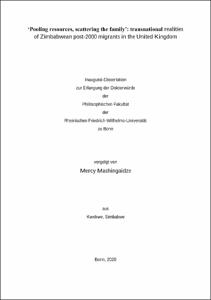Mashingaidze, Mercy: 'Pooling resources, scattering the family': transnational realities of Zimbabwean post-2000 migrants in the United Kingdom. - Bonn, 2020. - Dissertation, Rheinische Friedrich-Wilhelms-Universität Bonn.
Online-Ausgabe in bonndoc: https://nbn-resolving.org/urn:nbn:de:hbz:5-60631
Online-Ausgabe in bonndoc: https://nbn-resolving.org/urn:nbn:de:hbz:5-60631
@phdthesis{handle:20.500.11811/8836,
urn: https://nbn-resolving.org/urn:nbn:de:hbz:5-60631,
author = {{Mercy Mashingaidze}},
title = {'Pooling resources, scattering the family': transnational realities of Zimbabwean post-2000 migrants in the United Kingdom},
school = {Rheinische Friedrich-Wilhelms-Universität Bonn},
year = 2020,
month = dec,
note = {This thesis analyses how international migration (re)shapes migrants’ family life. Focusing on narratives drawn from purposefully sampled Zimbabwean migrants living in the United Kingdom (UK), it examines how family life is (re)constituted, experienced, negotiated, sustained, and perceived in long-drawn-out transnational situations. Of particular interest to the study is the often overlooked transnational family life that is birthed out of extended asylum limbo circumstances. To address this subject, the thesis introduces the notion of asylum tenebrosity to explain and analyse the enduring limbo that is impeding the reunification of some migrants with their close family members who stayed behind in Zimbabwe. Nested within a growing body of literature on transnational families, the thesis critically analyses how migrants in limbo ‘do’, manage, and sustain transnational family life. It addresses themes related to transnational parenting, transnational married life, transnational family life cycle ceremonies, and transnational elderly parental caregiving,from both migrant and non-migrant perspectives. Their everyday practices and interactions are analysed through the lens of transnational social spaces, ICT-based co-presence, family practices, and transnational care circulation. The findings demonstrate that international migration (re)organizes family life by geographically scattering family members and shifting the primary location of family life from physical to virtual spaces. While information and communication technologies (ICTs) play a vital role in sustaining transnational family life, they fall short of creating wholesome experiences of familyhood. The thesis argues that without occasional physical co-presence, family dynamics become complicated as relationship boundaries, communication protocols, roles, and cultural norms are gradually overstepped. Although transnational family members ensure mutual material survival by pooling and sharing resources, indefinite transnational family life ‘scatters’ the family along physical, moral, and affective lines. Consequently, this unsettles the essence of culturally defined Zimbabwean family values associated with parenting, marriage, intergenerational relations, family roles and responsibilities. This unsettling of values inevitably attracts conflicting reactions. Following up on these reactions, the thesis concludes with a deliberation on long-term implications of transnational family life on cultural values.},
url = {https://hdl.handle.net/20.500.11811/8836}
}
urn: https://nbn-resolving.org/urn:nbn:de:hbz:5-60631,
author = {{Mercy Mashingaidze}},
title = {'Pooling resources, scattering the family': transnational realities of Zimbabwean post-2000 migrants in the United Kingdom},
school = {Rheinische Friedrich-Wilhelms-Universität Bonn},
year = 2020,
month = dec,
note = {This thesis analyses how international migration (re)shapes migrants’ family life. Focusing on narratives drawn from purposefully sampled Zimbabwean migrants living in the United Kingdom (UK), it examines how family life is (re)constituted, experienced, negotiated, sustained, and perceived in long-drawn-out transnational situations. Of particular interest to the study is the often overlooked transnational family life that is birthed out of extended asylum limbo circumstances. To address this subject, the thesis introduces the notion of asylum tenebrosity to explain and analyse the enduring limbo that is impeding the reunification of some migrants with their close family members who stayed behind in Zimbabwe. Nested within a growing body of literature on transnational families, the thesis critically analyses how migrants in limbo ‘do’, manage, and sustain transnational family life. It addresses themes related to transnational parenting, transnational married life, transnational family life cycle ceremonies, and transnational elderly parental caregiving,from both migrant and non-migrant perspectives. Their everyday practices and interactions are analysed through the lens of transnational social spaces, ICT-based co-presence, family practices, and transnational care circulation. The findings demonstrate that international migration (re)organizes family life by geographically scattering family members and shifting the primary location of family life from physical to virtual spaces. While information and communication technologies (ICTs) play a vital role in sustaining transnational family life, they fall short of creating wholesome experiences of familyhood. The thesis argues that without occasional physical co-presence, family dynamics become complicated as relationship boundaries, communication protocols, roles, and cultural norms are gradually overstepped. Although transnational family members ensure mutual material survival by pooling and sharing resources, indefinite transnational family life ‘scatters’ the family along physical, moral, and affective lines. Consequently, this unsettles the essence of culturally defined Zimbabwean family values associated with parenting, marriage, intergenerational relations, family roles and responsibilities. This unsettling of values inevitably attracts conflicting reactions. Following up on these reactions, the thesis concludes with a deliberation on long-term implications of transnational family life on cultural values.},
url = {https://hdl.handle.net/20.500.11811/8836}
}






